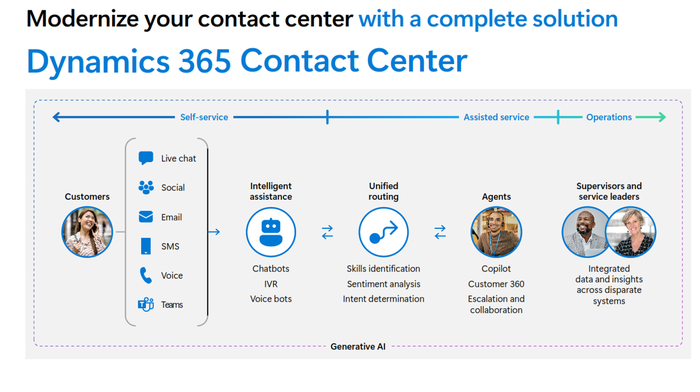Microsoft Debuts Dynamics Contact Center, a Copilot-First CCaaSMicrosoft Debuts Dynamics Contact Center, a Copilot-First CCaaS
The new product – and its ability to support other CRM applications – is a sign that Microsoft is preparing to go head-to-head with leaders in the CCaaS market.
June 4, 2024

Today, Microsoft announced Microsoft Dynamics Contact Center. The standalone contact center as a service (CCaaS) solution is scheduled to enter general availability on July 1st, when pricing for the solution will also be revealed. The timing coincides with the Customer Contact Week show in Las Vegas this week.
Microsoft Set the CCaaS Stage for Today’s Launch
During a pre-briefing to industry analysts from Jeff Comstock, corporate vice president of Dynamics 365 Customer Service the most intriguing thing he said was the solution does not require customers to be using Dynamics 365 as their customer relationship management (CRM) system. More on why that’s so intriguing below. First, a reminder that Microsoft has made a series of contact center and service announcements over the past five years that set the stage for today’s launch.
In 2019, Microsoft Dynamics 365 for Customer Service was announced, more similar to Salesforce Service Cloud than a contact center solution.
In 2022, the company introduced the Microsoft Digital Contact Center Platform, which combined capabilities from Dynamics 365, Teams, Nuance AI, and Azure Communication Services.
In November 2023, Microsoft Copilot for Service became available in public preview. Its goal was to synthesize vast amounts of data already available from an organization’s trusted knowledge sources to provide relevant, timely guidance to agents in their flow of work.
From my perspective, these announcements never resulted in a solution that competed directly with the established CCaaS vendors. In fact, CCaaS vendors have expended considerable effort over the same five-year period developing, marketing and successfully selling their certified integration to Microsoft Teams to companies, including 8x8, Five9, NICE, Vonage and others.
LLM-powered search engine Perplexity agrees with my assessment. Using the prompt, “Does Microsoft offer a contact center solution?” I received this reply, “While Microsoft does not offer a native, end-to-end contact center solution, it provides contact center capabilities through Dynamics 365 and enables integration of third-party solutions with Teams. Organizations can leverage Microsoft's ecosystem along with certified partner solutions to build their contact center environment.”
I expect Perplexity and similar search tools will have a new answer soon – everything I heard on this week’s briefing tells me Microsoft is preparing to go head-to-head with the leaders in the CCaaS market.
Integrating Gen AI via Copilot
As Comstock writes in his blog, generative AI (Gen AI) is transforming customer service and revolutionizing the way contact centers operate by delivering rich experiences across digital and voice channels that enable customers to resolve their own needs and equipping agents with relevant context within their workflows. Just as AWS’s customer service team provided insights when that company built Amazon Connect, Microsoft’s customer service and support (CSS) team provided valuable learnings as Microsoft built Dynamics 365 Contact Center.
Before Microsoft’s support team migrated to using its own tools, CSS was using 16 different systems and over 500 individual tools. With Copilot as part of the solution, the CSS team achieved a 12 percent decrease in average handle time for chat engagements and 13 percent decrease in agents requiring peer assistance to resolve an incident. In addition, Microsoft’s CSS has seen a 31 percent increase in first call resolution and a 20 percent reduction in missed routes.
Comstock says that Microsoft applied the learnings and insights from its own Copilot usage, coupled with the previously discussed investments in voice and digital channels, to build Dynamics 365 Contact Center. Dynamics 365 Contact Center infuses generative AI throughout the contact center journey: the channels of communication, self-service, intelligent routing, agent-assisted service, and operations with the goal of helping contact centers solve problems faster, empower agents, and reduce costs.
Three Key Dynamics 365 Contact Center Features
Comstock highlighted these key Dynamics 365 Contact Center capabilities in the analyst briefing and in his blog: self-service, human-assisted service and operational efficiency.
Self-service
Pre-integrated Copilots for digital and voice channels drive context-aware, personalized conversations and rich self-service experiences. The automation capabilities combine interactive voice response (IVR) technology from Nuance and Microsoft Copilot Studio’s no-code/low-code designer to provide end customers with engaging, individualized experiences powered by generative AI.
Human-assisted service
Intelligent unified routing steers incoming requests that require a human touch to the agent best suited to help. When a customer reaches an agent, Dynamics 365 Contact Center gives the agents a 360-degree view of the customer with generative AI — for example, real-time conversation tools like sentiment analysis, translation, conversation summary, transcription, and more are included to help improve service, along with others that automate repetitive tasks for agents such as case summary, draft an email, suggested response, and the ability for Copilot to answer agent questions grounded on trusted knowledge sources.
Operational efficiency
Analytics help service teams detect issues early, improve critical KPIs, and adapt quickly. With generative AI based real-time reporting, Dynamics 365 Contact Center allows service leaders to optimize contact center operations across all support channels including their workforce.

Dynamic 365 Contact Center: Ready for Scale Today
Don’t think of Dynamic 365 Contact Center as a CCaaS for smaller contact centers today that may scale over time. One of the key messages of the briefing was that the solution is ready for scale today. At general availability July 1st, it will be available in over 240 countries and regions, supporting up to 30 languages.
Also supporting the message of scalability, Microsoft identified 17 systems integrators that have already been onboarded to support Dynamics 365 Contact Center, including KPMG, Capgemini, Accenture, and EY. AWS used a similar approach when it launched Amazon Connect in 2017 – a strategy that certainly worked well to kickstart its product into the market.
Finally, Dynamics 365 Contact Center does not require use of the Microsoft CRM, Dynamics 365. For me, this is the most surprising part of the announcement. At launch, Dynamics 365 Contact Center will also work with Salesforce or custom-built CRMs. Over time, support will be extended to include other CRMs and case management solutions, e.g., Zendesk and ServiceNow.
The decision to support other CRM applications is a practical one. Based on multiple market share estimates, Dynamics 365 has less than 10% share of the CRM market while Salesforce’s share is above 25%. It also allows Microsoft to target the over one million organizations that have adopted Microsoft Teams.
To those who might say this Microsoft effort to truly enter the contact center market may be too little, too late, I say there is still plenty of opportunity. There are thousands of companies with millions of agents who continue to work on premises-based contact center systems. Watch this space.
About the Author
You May Also Like





